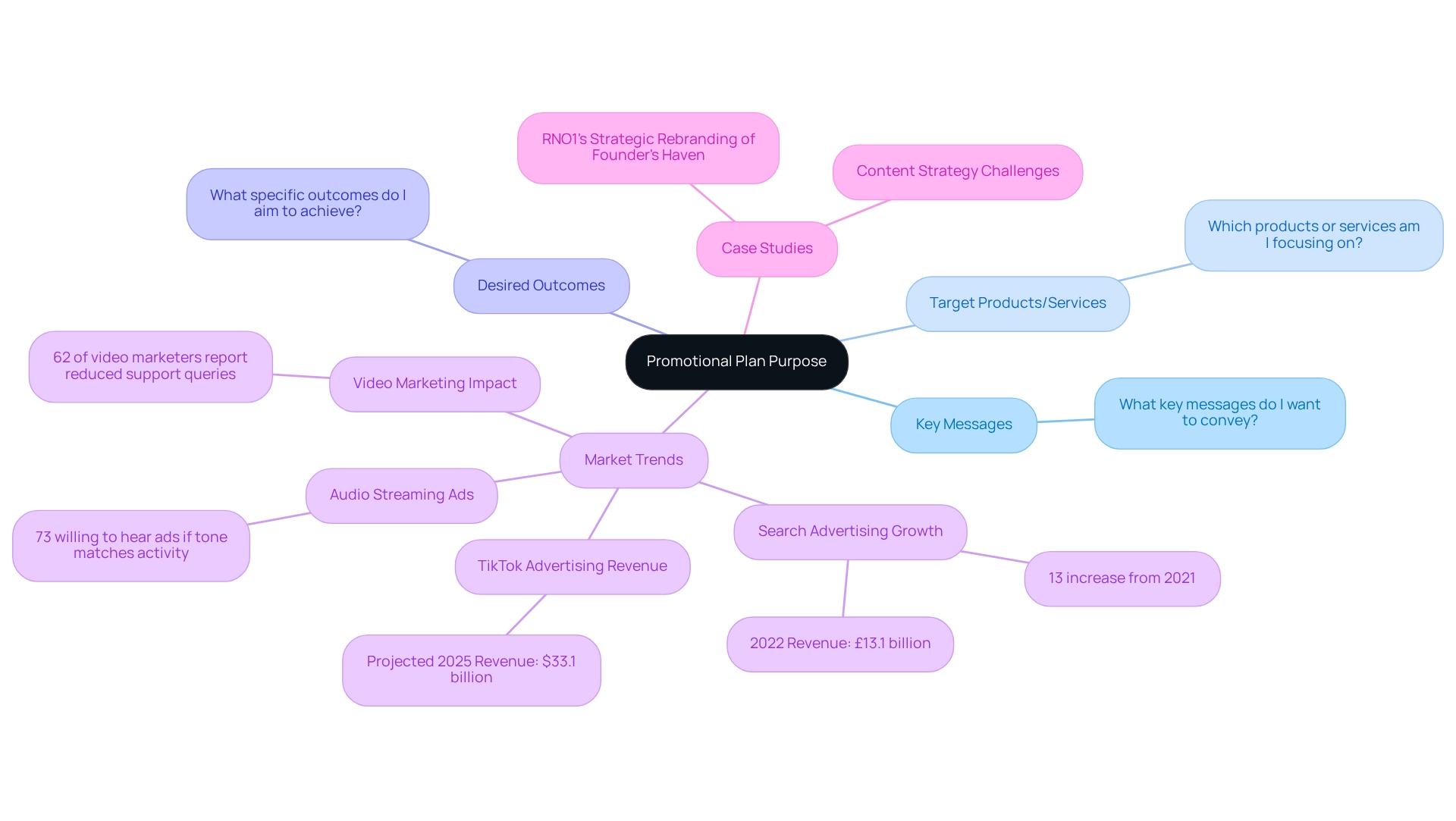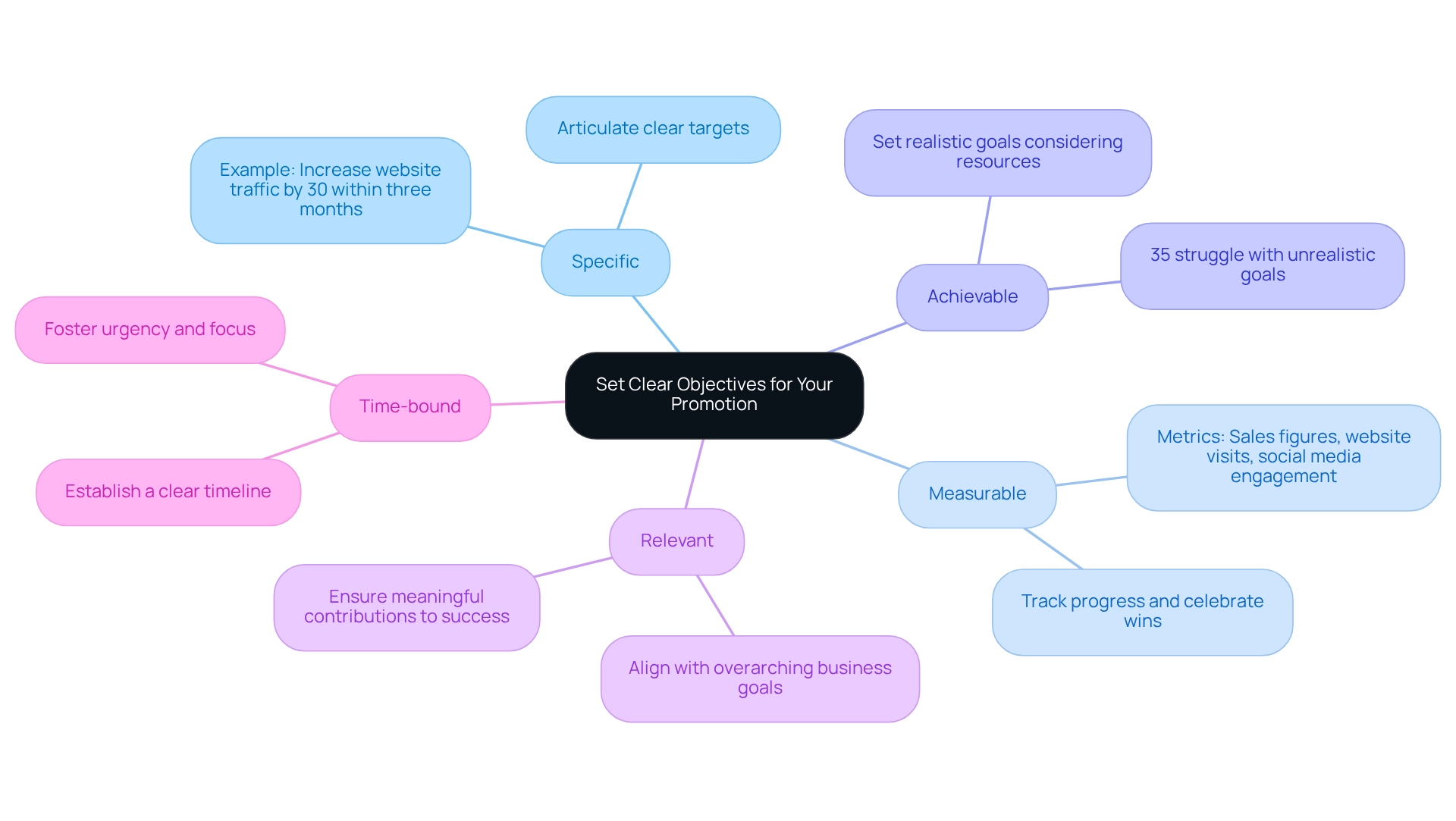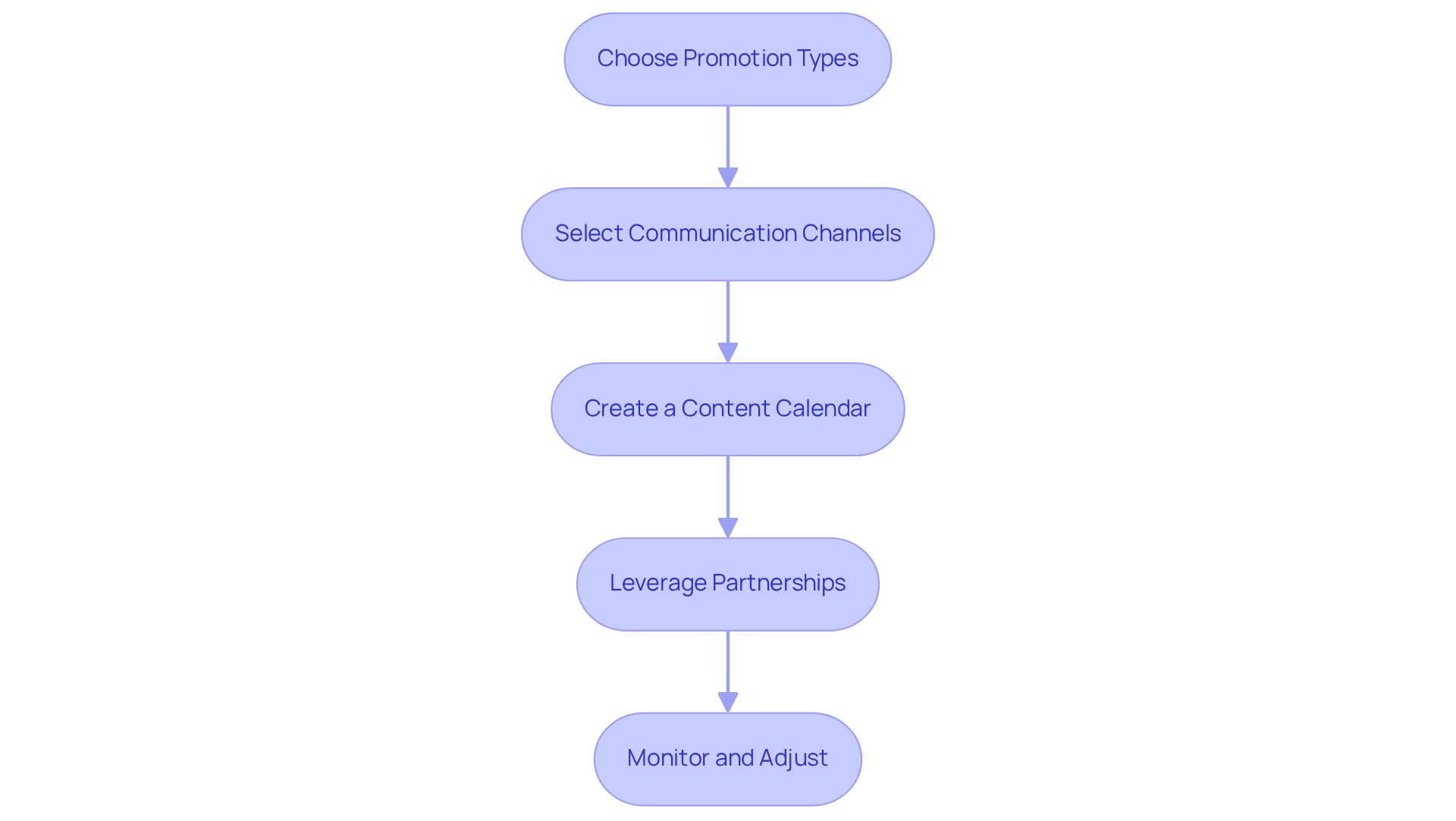Overview
Creating an effective promotional plan can often feel overwhelming for tech startup founders. You might find yourself grappling with the complexities of defining your audience, setting clear objectives, and wisely allocating your budget. These challenges can lead to feelings of uncertainty, especially in a competitive landscape where every decision counts.
However, by addressing these critical steps thoughtfully:
- Understanding the purpose of your plan
- Defining your target audience
- Setting clear objectives
- Developing actionable strategies
- Allocating your budget wisely
you can enhance your brand awareness and customer engagement. This nurturing approach not only helps alleviate the stress of navigating these challenges but also paves the way for improved sales and a stronger market presence.
Remember, you are not alone in this journey; many have faced similar hurdles and emerged successfully by embracing a well-structured promotional plan.
Introduction
In the competitive landscape of digital marketing, many founders face the daunting challenge of crafting a promotional plan that truly resonates. This struggle can leave you feeling overwhelmed, as the pressure to elevate brand visibility, drive sales, and enhance customer engagement mounts.
As you navigate the complexities of audience targeting and budget allocation, it’s essential to understand the core elements of an effective promotional plan. Consider how defining your target audience and setting clear, measurable objectives can transform your approach. Each component plays a crucial role in creating campaigns that connect deeply with your audience.
In a world where innovative marketing strategies are constantly emerging and data-driven decisions are more crucial than ever, adapting your approach can feel like an uphill battle. But remember, you are not alone in this journey. Embracing a supportive strategy can empower you to thrive in this ever-evolving marketplace, and together, we can explore solutions that nurture your growth and success.
Understand the Purpose of a Promotional Plan
A marketing plan is not just a document; it’s a vital strategic tool that outlines your marketing and advertising initiatives over a defined timeframe. Its primary purpose is to , drive sales, and foster customer engagement. However, creating an effective marketing plan can feel overwhelming. To help you navigate this journey, consider these critical questions:
- What key messages do I want to convey?
- Which products or services am I focusing on?
- What specific outcomes do I aim to achieve through this promotion?
By thoughtfully addressing these questions, you can establish a clear direction for your marketing activities, ensuring they align with your business objectives and resonate with your target audience. In 2022, , reflecting a 13% increase from the previous year. This statistic underscores the effectiveness of well-structured promotional plans in driving sales, particularly for tech startups seeking to establish a strong market presence. Moreover, 62% of video marketers have indicated a reduction in support inquiries due to the clarity and engagement offered by video content, highlighting the . As we look towards 2025, the landscape continues to evolve, with platforms like TikTok expected to generate $33.1 billion in advertising revenue, signaling a shift towards dynamic and engaging marketing techniques.
Recent trends indicate that . For instance, focus on achieving , which can enhance methods to meet goals and improve overall performance. This is especially crucial for tech startups aiming to carve out a niche in a competitive market. A case study on RNO1's illustrates how can empower modern founders for digital success, ultimately leading to better alignment with community needs.
through clear communication and collaborative project management, ensuring that marketing approaches are not only impactful but also sustainable in the long run. Expert opinions emphasize that is essential for navigating the complexities of digital marketing. Additionally, a recent study revealed that 73% of participants are willing to hear ads on audio streaming platforms if the tone matches their current activity, highlighting the importance of aligning marketing approaches with listener preferences.

Define Your Target Audience
can feel overwhelming, yet it's essential for an effective . Many founders struggle with this task, often feeling uncertain about how to connect with their audience. By and conducting thorough market research, you can alleviate some of this stress. Here are some supportive steps to guide you:
- Analyze Demographics: Start by identifying key demographic factors such as age, gender, income level, and education of your ideal customers. In 2025, , as the ecosystem continues to evolve, with the Netherlands alone valued at €232 billion. It's important to note that the count of men involved in enterprises is 7 percentage points greater than the count of women entrepreneurs worldwide, highlighting the need for diversity in your promotional approaches.
- Understand Psychographics: Take the time to delve into the of your target group. This psychographic data is essential for to resonate with potential customers on a deeper level.
- Utilize : Engaging with your clients through surveys or interviews can uncover valuable insights into their preferences and pain points. This direct feedback is a powerful tool that can effectively guide your promotional plan.
- Segment Your Group: Organizing your participants according to common traits enables you to develop tailored messages that address their needs directly, fostering a stronger connection.
As Indra Nooyi, CEO of PepsiCo, wisely stated, " You must continually increase your learning, the way you think, and the way you approach the organization." This mentality is crucial for as they adapt their promotional strategies based on consumer perspectives.
By clearly defining your target market, you can develop a promotional plan that not only engages but also converts, ultimately driving growth for your tech startup. It's encouraging to note that first-time startup founders have seen an improvement in success rates, now at 18%, indicating that learning from past failures is key to refining marketing approaches. Understanding audience demographics and psychographics will empower you to create compelling campaigns that stand out in a competitive landscape. Moreover, the recent recognition of six startups from the Netherlands at CES 2025 for innovation underscores the potential rewards of effective marketing strategies.
Set Clear Objectives for Your Promotion
When establishing objectives for your , many founders face the challenge of . It can be overwhelming to navigate the myriad of expectations in the fast-paced world of tech startups. Without , it’s easy to feel lost, leading to frustration and stagnation.
This is where the come into play, offering a nurturing framework to guide you:
- Specific: Clearly articulate what you aim to achieve. For instance, 'Increase website traffic by 30% within three months' provides a precise target that you can rally your team around.
- Measurable: Ensure your objectives can be quantified. Metrics such as sales figures, website visits, or social media engagement are crucial for tracking progress and celebrating small wins along the way.
- Achievable: Set realistic goals that consider your available resources and current market conditions. It's important to remember that research shows 35 percent of people struggle to meet their New Year’s resolutions due to unrealistic expectations. This highlights the importance of setting that foster a sense of accomplishment.
- Relevant: Align your objectives with your overarching business goals. This guarantees that each marketing effort contributes meaningfully to your success, creating a sense of purpose.
- Time-bound: Establish a for achieving your objectives. A defined timeframe fosters urgency and keeps your team focused on the end goal.
Research indicates that limiting the number of goals and keeping them specific significantly enhances the likelihood of success. In fact, over 1,000 studies have shown that setting leads to improved task , motivation, and persistence compared to vague objectives. As Norman Vincent Peale observed, successful individuals have clear objectives, emphasizing the importance of specificity in your marketing strategy. Winston Churchill also highlighted the importance of focus, stating, 'You will never reach your destination if you stop and throw stones at every dog that barks.' By applying the SMART criteria, you can that effectively steer your marketing approaches, ultimately leading to quantifiable business results. The case study titled 'High Goals and Task Performance' further supports this, demonstrating that is an effective approach for enhancing overall performance and motivation. Remember, you are not alone in this journey; many have walked this path and found success by embracing clarity and purpose in their goals.

Develop Actionable Strategies
To create actionable strategies for your , it’s essential to consider a few thoughtful steps that can truly resonate with your journey as a founder:
- Choose Promotion Types: Begin by selecting promotion types that genuinely connect with your target group. Options like discounts, contests, or referral programs can be particularly effective. Research shows that . However, it’s important to note that a substantial majority of customers (73%) dislike pop-up ads, which can negatively impact user experience. Therefore, avoiding such tactics can lead to improved and a more positive relationship with your audience.
- Select Communication Channels: Next, identify the channels that will most effectively engage your intended group. Social media platforms, email marketing, and even traditional advertising can play crucial roles. Understanding where your target group spends their time is key to this process. Data indicates that tech startup viewers often favor digital communication, making online channels essential. Brian Solis highlights the sociological and psychological aspects of social media, which can enhance audience engagement and foster a sense of community.
- Create a : Developing a content calendar can help you organize your marketing activities in a way that feels manageable and strategic. This calendar should detail what content will be shared, when, and on which platforms, ensuring a consistent approach that aligns with your goals.
- Leverage Partnerships: Consider collaborating with influencers or complementary brands to enhance your reach and credibility. RNO1's serves as a powerful example of how scaling omnichannel brand ambassador programs can significantly boost through influencer partnerships. By tapping into established networks, you can introduce your brand to new audiences, driving engagement and sales. The Ryde initiative offers specific advantages, such as , making it a valuable approach for tech startups seeking to grow.
- Monitor and Adjust: Finally, it’s crucial to continuously assess the effectiveness of your marketing approaches. Regularly analyzing feedback and results allows you to make informed adjustments, ensuring your tactics remain effective and aligned with your evolving goals.
Moreover, the U.S. Small Business Administration advises that startups dedicate to marketing, providing a clear financial guideline for your advertising budget. By applying these clear, actionable approaches, you can effectively implement your promotional plan and achieve meaningful outcomes for your tech startup. As Brandon Andersen wisely states, "Marketing strategy will impact every piece of your business, and it should be tied to every piece of your business.

Allocate Your Budget Wisely
To allocate your budget wisely and alleviate the stress that often accompanies , consider these essential steps:
- Determine Total Budget: Begin by evaluating . This foundational step establishes how much can be dedicated to outreach activities. For instance, if your company’s revenue reaches $2 million, allocating 9% means you would have a budget of $180,000 for promotion. Understanding this can ease the anxiety of uncertainty.
- Prioritize Spending: It’s crucial to identify that are likely to yield the highest (ROI). Many successful examples show that focusing on high-impact channels significantly enhances promotional effectiveness. As highlighted in the , effective CMOs elevate the value of marketing by helping other leaders grasp their role in the business and market.
- Break Down Costs: Take the time to itemize expenses for each marketing activity, including advertising, content creation, and distribution. This detailed breakdown not only clarifies where your funds are going but also fosters transparency in spending, which can alleviate concerns about financial mismanagement.
- Monitor Spending: Regularly tracking your expenditures against your budget is vital to prevent overspending. This practice is essential for and achieving your advancement goals. The case study titled "" illustrates how cultivating sound financial habits leads to sustainable budgeting practices, which are crucial for long-term success.
- Evaluate ROI: After each marketing campaign, take the time to analyze the return on investment. Understanding which approaches were most effective allows you to make informed adjustments in future budgets, ensuring that your and impactful. In light of the evolving B2B advertising and marketing strategies in the U.S., staying informed about current trends will further enhance your budgeting decisions.
By implementing these steps, you can strategically allocate your budget, maximizing the effectiveness of your promotional plan while ensuring long-term financial viability. Remember, you’re not alone in this journey; many founders face similar challenges, and together, we can navigate these complexities with confidence.
Conclusion
Crafting an effective promotional plan can feel daunting for tech startups striving to thrive in a competitive digital landscape. Many founders grapple with the overwhelming task of enhancing brand awareness, driving sales, and fostering meaningful customer engagement. It's essential to recognize that defining target audiences through detailed demographic and psychographic analysis is not just a step—it's a crucial foundation that ensures marketing strategies truly resonate with potential customers. By setting clear, measurable objectives using the SMART criteria, you can create a structured approach that guides your promotional efforts toward achieving meaningful results.
Moreover, developing actionable strategies tailored to your audience is key to executing successful campaigns. Choosing the right communication channels, creating a content calendar, and leveraging partnerships can significantly boost engagement and visibility. It’s also vital to allocate your budget wisely—determining total spending, prioritizing high-impact strategies, and continuously monitoring expenditures can make a world of difference. Evaluating the return on investment after each campaign not only helps refine future promotional efforts but also provides reassurance that your hard work is paying off.
Ultimately, navigating the complexities of digital marketing requires a comprehensive and adaptable promotional plan. By embracing these strategies, you can connect with your audience on a deeper level and position your startup for sustainable growth and success in an ever-evolving marketplace. Remember, you are not alone in this journey; many have walked this path and found their way to success, and with the right approach, you can too.
Frequently Asked Questions
What is the purpose of a marketing plan?
The primary purpose of a marketing plan is to enhance brand awareness, drive sales, and foster customer engagement over a defined timeframe.
What are some critical questions to consider when creating a marketing plan?
Important questions to consider include: What key messages do I want to convey? Which products or services am I focusing on? What specific outcomes do I aim to achieve through this promotion?
How can effective marketing strategies impact customer interaction?
Effective marketing strategies not only enhance brand awareness but also greatly improve customer interaction, leading to better engagement and satisfaction.
What is the significance of understanding your target market in a promotional plan?
Defining your target market is essential for an effective promotional plan, as it helps tailor marketing strategies to resonate with potential customers, ultimately driving growth.
What steps can help in defining a target market?
Steps to define a target market include analyzing demographics, understanding psychographics, utilizing customer feedback, and segmenting your audience based on common traits.
How can customer feedback influence a promotional plan?
Customer feedback, gathered through surveys or interviews, provides valuable insights into preferences and pain points, guiding the development of a more effective promotional plan.
What role does diversity play in promotional approaches?
The disparity in the number of male and female entrepreneurs highlights the need for diversity in promotional approaches, which can enhance marketing effectiveness.
What recent trends indicate the effectiveness of marketing plans?
In 2022, search advertising in the UK generated £13.1 billion, reflecting a 13% increase from the previous year, demonstrating the impact of well-structured promotional plans.
What is RNO1's approach to marketing strategies?
RNO1 focuses on preventing scope creep through clear communication and collaborative project management, ensuring that marketing approaches are impactful and sustainable.
How are audio streaming platforms relevant to marketing strategies?
A study revealed that 73% of participants are willing to hear ads on audio streaming platforms if the tone matches their current activity, emphasizing the importance of aligning marketing approaches with listener preferences.




